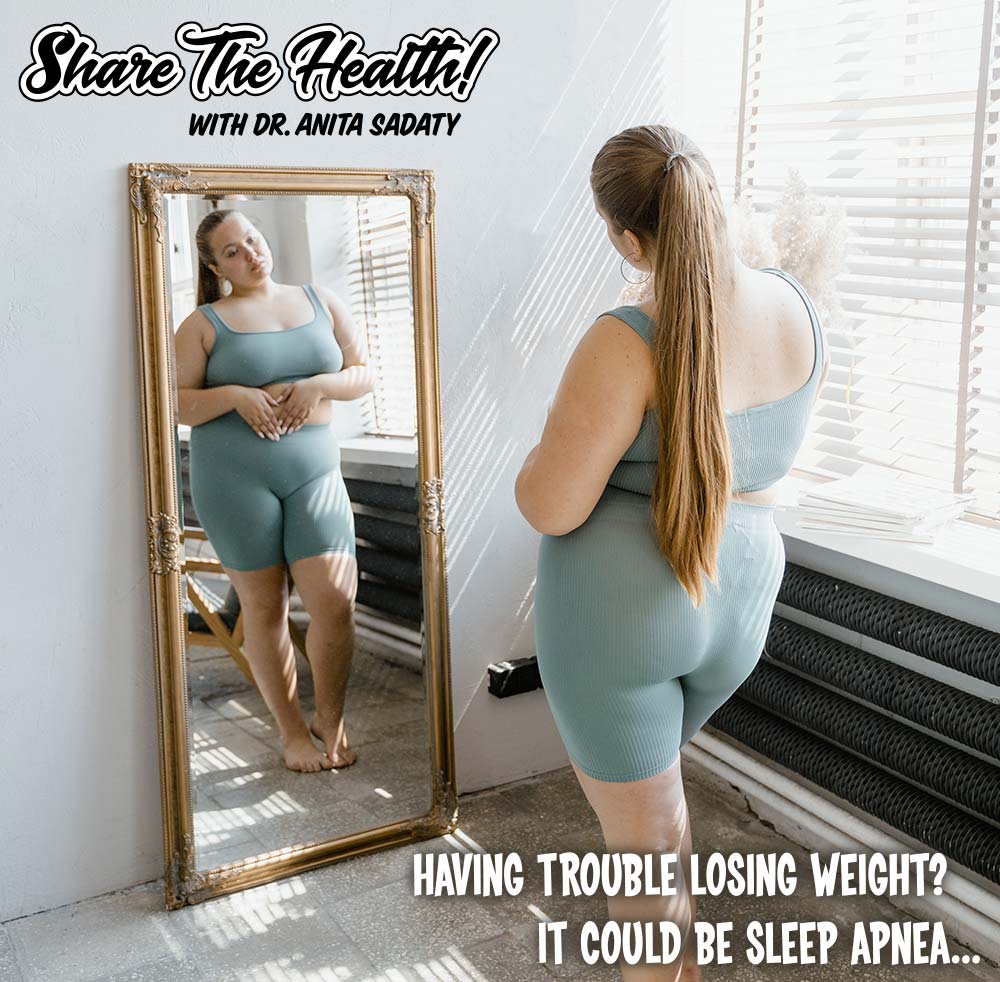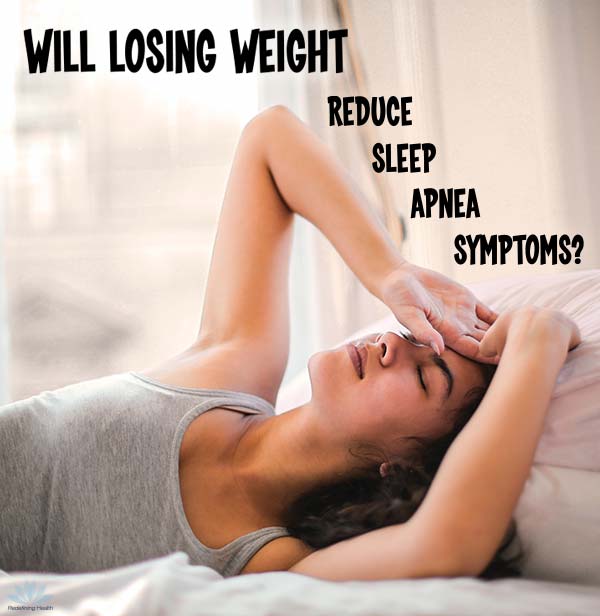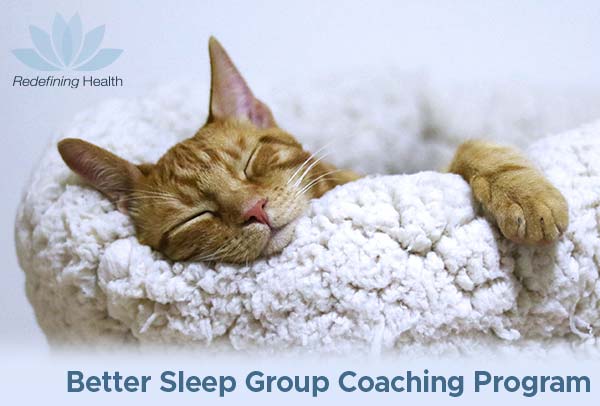
By Lucy Gade, MD
Does Sleep Apnea Cause Weight Gain?
About 70% of people with obstructive sleep apnea are overweight. But does sleep apnea cause weight gain (or vice versa), or are these two things completely unrelated?
What Is Sleep Apnea?
Sleep apnea is when the airway is partially blocked and breathing can stop for short periods of time while a person sleeps. Often your breathing only stops for 10 seconds at a time. However, these short stops can lead to multiple wakings during the night, gasping for air, snoring and daytime fatigue.
This is not a rare problem. Forty percent of people snore and 80% of snorers have sleep apnea.
Obstructive sleep apnea is not just about snoring. The snoring happens when your neck muscles relax, the tissues of the airway collapse, and air is blocked leading to dropping oxygen levels.
These episodes can lead to many other health problems including: diabetes or pre-diabetes, high blood pressure, acid reflux (GERD), brain fog or memory loss, and heart disease
Does Sleep Apnea cause Weight Gain or prevent Weight Loss?
Holding extra weight can contribute to sleep apnea, but is the opposite true? Can having sleep apnea make it hard for individuals to lose weight? Unfortunately for many people, the answer is YES! And here’s why…
Decreased oxygen while sleeping can affect your ability to maintain a healthy weight because it leads to:
- Low energy and chronic fatigue. Even one night of poor sleep can leave people feeling miserable the next day. Imagine the impact that months or even years of restless sleep can have on energy levels. When we experience low energy, we use the energy we have for essential tasks (like going to work). This means avoiding “non-essential” activities like exercising and eating healthy. This forces us to make poor food choices and we become less active. Over periods of weeks to months, the weight will pile on.
- Slower metabolism. One reason your metabolism slows down is because when you are tired, you move less and burn fewer calories. Beyond moving and burning less, when tired and fatigued, your body goes into hibernation mode and signals your body to conserve energy. Over time, this slowed metabolism will lead to weight gain without even eating more.
- Increased cravings and decreased “willpower.” When we’re feeling tired, we are more likely to crave foods high in sugar because we are looking for a quick energy boost. Being exhausted also decreases our willpower to make healthy choices. This is a perfect storm for weight loss resistance and continued weight gain.
- Hormonal changes. Two important hormones GHRELIN and LEPTIN are responsible for sending messages to the brain for hunger and satiety. They are both directly affected by sleep apnea. Poor sleep messes with your hunger and satiety signals. When you don’t have restful sleep, GHRELIN hunger signals increase and leptin “I’m full,” signals decrease. Because your hormones are telling you to eat more and won’t signal you to stop eating, weight loss is nearly impossible.
- Fat causes inflammation. As we accumulate more fat, we increase our body’s inflammation. Inflammation leads to reasons 1-4 becoming even more of a problem.
Will Losing Weight Reduce Sleep Apnea Symptoms?
Without treatment for sleep apnea or taking steps to get to a healthy weight, a vicious cycle occurs. Weight gain leads to sleep apnea, which leads to weight gain, which makes sleep apnea worse, which leads to more weight gain and so on.
On the positive side, this cycle can work both ways. Getting treatment for sleep apnea can improve sleep quality, making it easier to lose weight. Research shows that losing even 10% of your weight can lead to a 20% drop in sleep apnea symptoms.

Think you may have sleep apnea? Here’s what can you do!
If you are experiencing sleep deprivation or fragmented sleep due to snoring or suspect you may have sleep-apnea, you can:
Download The Snorelab App.
SnoreLab is an app that records snoring. By measuring nightly changes in your snoring intensity with SnoreLab, you can hear what you sound like, so you don’t just have to take your partner’s word for it!
This is not a rare problem. Forty percent of people snore and 80% of snorers have sleep apnea.
Take An On-Line Questionnaire
Three validated questionnaires that can be used to assess risk for sleep apnea are:
- STOP Questionnaire for Obstructive Sleep Apnea (OSA)
- The Official STOP-Bang Questionnaire Website
- Berlin Questionnaire Sleep Apnea
Consult With A Physician
Bring up your concerns with your primary care doctor, a pulmonary doctor or a sleep specialist. They will likely order a sleep study which can now be done in the comfort of your own home.
Proper treatment following test results can help you start getting back to the restful nights you deserve. The most common and effective treatment for sleep apnea is CPAP therapy. CPAP, or continuous positive airway pressure, provides a constant stream of air that holds the airway open during sleep. Consistent use of a CPAP device can help reduce symptoms of brain fog, cardiovascular disease and heart attacks.
Lifestyle Recommendations:
Try to Lose Excess Weight. Weight loss can help symptoms, but it won’t necessarily cure the disorder. Since symptoms can worsen if you gain weight, losing weight can help you combat symptoms of sleep apnea. One study showed that weight loss in moderately obese patients reduced the need for long-term CPAP therapy. Also, weight loss when combined with CPAP therapy may result in even greater weight loss.
✓ Become more active! Exercise can be an important contributor to a successful weight loss plan in more ways than one.
- Recent research found that simply increasing your overall activity level could reduce your risk of sleep apnea independent of actually losing weight. This includes standing more throughout the day or even engaging in gentle physical activities.
- Exercise doesn’t have to be intense to be effective. One study showed that compared to more active participants, those who spent four or more hours per day watching TV had a 78% higher risk of being diagnosed with sleep apnea.
So whether you’re into aerobic exercise, yoga, or just taking a walk each day, just getting off the couch and getting some exercise is a great first step for preventing obstructive sleep apnea. My recommendation: try to get 30 minutes of moderate activity, such as a brisk walk, most days of the week.
✓ Avoid alcohol and certain medications such as tranquilizers and sleeping pills. These substances relax the muscles in the back of your throat and further interfere with breathing.
✓ Sleep on your side or stomach rather than on your back. Sleeping on your back can cause your tongue and soft palate to rest against the back of your throat and block your airway. (This simple modification helps my husband a great deal.) To keep from rolling onto your back while you sleep, try attaching a tennis ball to the back of your pajama top. There are also commercial devices that vibrate when you roll onto your back in sleep.
✓ Don’t smoke. If you’re a smoker, look for resources to help you quit or ask your doctor about smoke cessation programs and medications.
✓ Consider Yoga. Yoga can help improve your oxygen flow and improve the strength of your lungs for better respiration. Breathing techniques used in Yoga can increase your oxygen levels.
✓ Try a humidifier in your bedroom. Dry air often causes irritation in the breathing passages. Making use of a humidifier while you sleep can help open your airways, reduce congestion, and promote clearer breathing.
✓ Consider using essential oils. Adding peppermint, lavender, or eucalyptus oil in your humidifier have been shown to provide soothing and anti-inflammatory benefits.
✓ Treat congestion, acid reflux and cough. Individuals struggling with heavy snoring and sleep apnea can also experience heartburn, chronic cough, and congestion. Reduce your exposure to allergens, adjust your diet, and raise your head when sleeping to help reduce these symptoms.
For individuals who are experiencing difficulty sleeping, contact our office to sign up for our Better Sleep Group Coaching Program. If you are experiencing weight loss resistance, schedule a functional medicine consultation with our doctors to find out if sleep apnea may be at the root.

Please Share the Health if you liked what you read!!!
For more information about my wellness programs and my practice, check out my website drsadaty.com. Hey Look! You are already here…
Ready for the legal disclaimer? Information offered here is for educational purposes only and does not constitute medical advice. As with any health recommendations, please contact your doctor to be sure any changes you wish to consider are safe for you!